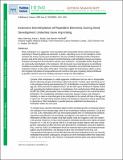Extensive Demethylation of Repetitive Elements During Seed Development Underlies Gene Imprinting
Author(s)
Gehring, Mary; Bubb, Kerry L.; Henikoff, Steven
DownloadGehring_Extensive demethylation.pdf (2.391Mb)
OPEN_ACCESS_POLICY
Open Access Policy
Creative Commons Attribution-Noncommercial-Share Alike
Terms of use
Metadata
Show full item recordAbstract
DNA methylation is an epigenetic mark associated with transposable element silencing and gene imprinting in flowering plants and mammals. In plants, imprinting occurs in the endosperm, which nourishes the embryo during seed development. We have profiled Arabidopsis DNA methylation genome-wide in the embryo and endosperm and found that large-scale methylation changes accompany endosperm development and endosperm-specific gene expression. Transposable element fragments are extensively demethylated in the endosperm. We discovered new imprinted genes by the identification of candidates associated with regions of reduced endosperm methylation and preferential expression in endosperm relative to other parts of the plant. These data suggest that imprinting in plants evolved from targeted methylation of transposable element insertions near genic regulatory elements followed by positive selection when the resulting expression change was advantageous.
Date issued
2009-06Department
Massachusetts Institute of Technology. Department of BiologyJournal
Science
Publisher
American Association for the Advancement of Science (AAAS)
Citation
Gehring, M., K. L. Bubb, and S. Henikoff. “Extensive Demethylation of Repetitive Elements During Seed Development Underlies Gene Imprinting.” Science 324, no. 5933 (June 11, 2009): 1447-1451.
Version: Author's final manuscript
ISSN
0036-8075
1095-9203